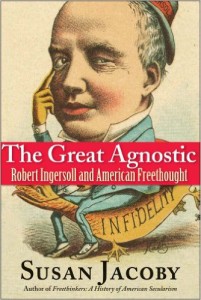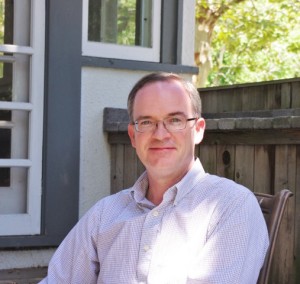Susan Jacoby, The Great Agnostic: Robert Ingersoll and American Freethought (New Haven: Yale University Press, 2013), x + 246 pages.
Review by Paul V. Murphy
One of the reasons for the popularity of Robert G. Ingersoll, the once-famous nineteenth-century lawyer and orator, despite his vocal (and scandalous) agnosticism, surely must have been his wry humor. Ingersoll’s father was a strict Calvinist, and he later recalled the pious oppression of his childhood routine on Sunday, a day “altogether too holy to be happy in.” He recalled the formidable sermons from the Calvinist divines, commencing with the “firstly” point and continuing on to the “twenty-thirdly.” The minister asked whether the congregation knew they were destined for hell, to which they answered, “Yes.” Were they willing to go to hell willingly in deference to God’s will, “and every little liar shouted ‘Yes,’” Ingersoll recalled. An occasional reward for surviving the tortures of a long day of moral admonition was, of all things, a trip to the graveyard. “It did cheer me,” Ingersoll recalled. “When I looked at the sunken tombs and the leaning stones, and read the half-effaced inscriptions through the moss of silence and forgetfulness, it was a great comfort. The reflection came to my mind that the observance of the Sabbath could not last forever.”[1] In a debate with Henry Cardinal Manning in the North American Review in 1888, Ingersoll expressed the disgust he felt at the blanket appeal to the authority of church fathers. “They believed everything—they examined nothing,” he explained. “They received as the waste-basket receives.”[2] Surely unfair to the ancient teachers, the tartly-stated and prosaic image suggests something of how, unlike the Calvinist ministers of his youth, Ingersoll made theological debates vivid, interesting, and understandable.
In her new, short study of Ingersoll’s thought, free-lance intellectual historian and noted secular humanist Susan Jacoby attempts to recall Ingersoll’s fame and make a case for his continued relevance. History is important to Jacoby; in part, she values Ingersoll for his contributions to rehabilitating the reputation of Thomas Paine. She also values his hold on a popular audience. In a concluding “Letter to the ‘New’ Atheists,” she not only credits Ingersoll with lucid explanations of scientific inquiry, the injustices due to religion, and the secular foundations of the nation but also asserts that the preservation of his memory is an obligation. “You owe him,” she admonishes her peers (202).
Ingersoll was born in upstate New York in 1833. His mother, a temperance and antislavery advocated, died when he was only two years old. His stern but loving father, John Ingersoll, was not completely immune to the reformist fires burning of his times. He was an admirer of Charles Grandison Finney, an abolitionist, and a Democrat.[3] The Rev. Ingersoll moved his family throughout the Old Northwest; Robert came of age and began his career as a lawyer in Illinois in the 1850s. Like his father, Ingersoll became an antislavery Democrat (running unsuccessfully for Congress in 1860), although he switched to Lincoln’s party during the war, in which he volunteered and fought at the Battle of Shiloh. Ingersoll briefly aspired to a political career, being appointed Illinois attorney general in 1867, but, failing to win the state’s gubernatorial nomination in 1868, he instead 
fashioned a career that straddled what are now the distinct realms of celebrity lawyer (Ingersoll specialized in corporate and criminal law), political operative, and public intellectual. In 1876 the backers of the somewhat tarnished James G. Blaine tasked Ingersoll with nominating the senator at the Republican convention. Ingersoll brazenly hailed Blaine as a paragon of character, a “plumed knight” who had fearlessly tilted with the political opposition in the name of sacred Republican principles. His rousing speech made him a desired Republican speaker and noteworthy public figure for the rest of his life. (He died in 1899.) In lectures and essays, Ingersoll repeatedly and continuously attacked religious belief as logically untenable, analyzed religious systems as products of specific historical cultures, and denounced organized religion as the source of intolerance and superstition. He popularized agnosticism as the logical product of science-driven progress. He also espoused a “happiness creed,” a kind of Gemütlichkeit secularism focused on homely pleasures and personal happiness—a way of life that “means food and fireside, roof and raiment, reasonable work and reasonable leisure, the cultivation of the tastes, the acquisition of knowledge, the enjoyment of the arts,” one that promises “the human race comfort, independence, intelligence, and, above all, liberty” (126).
The Great Agnostic
is not a concise intellectual biography. Jacoby relies primarily on Ingersoll’s published writings and letters and on previous biographies (there have been eight of them). She did not consult Ingersoll’s voluminous papers at the Library of Congress nor any other manuscript collection. Though her observations are uniformly acute, Jacoby does not dwell on the intellectual context of Ingersoll’s career nor provide a careful explication of his ideas. Rather, she highlights the aspects of his career she finds most pertinent. This is a present-minded essay from a history-minded secularist. Well-known in his lifetime, Ingersoll’s fame began to fade in the 1920s, in part, Jacoby believes, because the nation’s secularized intellectual elite, after the supposed rout of Fundamentalists in the Scopes Trial controversy, became complacent. They were wrong, Jacoby asserts ruefully. Fundamentalism had been “prematurely declared dead”; by the 1980s, it was clear that the nation was not rid of “science-proof” thinking (25-26). The book is a brief for the importance of people like Ingersoll—public intellectuals who can compellingly demonstrate the persisting power of the “most repressive forms of religion and their continuing battle to minimize the influence of scientific knowledge and understanding” (187). In Jacoby’s view, secularism is under assault, in no way more insidiously than through what Jacoby views as conservative Christian attempts to rewrite the history of the United States as a Christian nation.[4]
Jacoby’s approach to Ingersoll is selective. She hones in on his insistence on the separation of church and state and his respect for Paine. She emphasizes the causes that appeal to contemporary progressives: Ingersoll’s support for racial equality, African-American civil rights, and a women’s rights to contraception and divorce and opposition to nativism, Chinese Exclusion, and anti-obscenity laws. Ingersoll the corporate lawyer, inveterate partisan waver of the bloody flag, proponent of the retrogressive dogma of the gold standard, and fiery opponent of William Jennings Bryan’s 1896 Populist campaign is harder to find in her account. (Ingersoll was “an economic conservative on some issues” Jacoby notes glancingly [98].)
“The common thread in all of Ingersoll’s thinking about social issues,” Jacoby argues, “was secular humanism and its emphasis on the promotion of happiness in this world” (125). However, although he spoke of the “religion of Humanity,” which took as its idol the free and rational man, Ingersoll almost certainly did not use the phrase secular humanism and did not embody the secular humanism of today, a narrowly rationalist movement almost exclusively focused on debunking religious belief.[5] In Ingersoll’s time, ideas about science and democracy were still entwined with the Victorian “ideology of culture,” an elaborate language of self-culture and personal development expressed in a romantic faith in man and antipathy to authority encrusted in institutions.[6] As James Turner pointed out thirty years ago, late nineteenth-century unbelief was a recognizable “subculture” of Victorianism, premised on the Protestant commitment to individual autonomy, truth to oneself, honesty, and intense moralism. By linking faith in God so tightly to verifiable scientific knowledge and moral sentimentalism, Church leaders had set the conditions for the late Victorian crisis of faith. When intellectuals no longer could accept knowledge based on revelation alone and a Christian God indifferent to human suffering, they had few choices other than unbelief. Agnostics ended up “insisting…that it is always and everywhere wrong to believe what we do not know,” Turner observed.[7]
Jacoby’s misses this context as well as the Emersonian reverberations in Ingersoll’s agnosticism: “In my judgement, every human being should take a road of his own,” Ingersoll declared. “Every mind should be true to itself—should think, investigate, and conclude for itself.”[8] In reading the Romantic poets, Robert Burns, Shakespeare, the eighteenth-century philosophes, Ingersoll shed his religious beliefs and enjoyed the “joy of freedom”: “I was free—free to think, to express my thoughts—free to live to my own ideal—free to live for myself and those I love—free to investigate, to guess and dream and hope…. I was free.”[9] In Ingersoll’s hands this inspiring credo of personal autonomy led to his slashing attacks on the institutions of religion and to his gospel of cheerfulness, a late Victorian, therapeutic variant of the ideology of culture in its decadent phase. “Happiness is he only good,” Ingersoll declared. “The time to be happy i s now. The place to be happy is here. The way to be happy is to make others so” (97).
s now. The place to be happy is here. The way to be happy is to make others so” (97).
Paul Murphy teaches at Grand Valley State University and is the author of The New Era: American Thought and Culture in the 1920s (2012) and The Rebuke of History: The Southern Agrarians and American Conservative Thought (2001). He is currently working on a study of American humanist thought in the first half of the twentieth century.
[1] David D. Anderson, Robert Ingersoll (New York: Twayne, 1972), 21-22.
[2] Anderson, Robert Ingersoll, 107.
[3] Some biographical detail comes from David D. Anderson, Robert Ingersoll (New York: Twayne, 1972).
[4] The issue is more subtly treated in David Sehat’s The Myth of American Religious Freedom (New York: Oxford University Press, 2011).
[5] Anderson, Robert Ingersoll, 87.
[6] For the term “ideology of culture,” see Lewis Perry, Intellectual Life in America: A History (Chicago: University of Chicago Press, 1989), 263-76.
[7] James Turner, Without God, Without Creed: The Origins of Unbelief in America (1985; reprint, Baltimore: Johns Hopkins University Press, 1986), 215.
[8] Anderson, Robert Ingersoll, 91.
[9] Anderson, Robert Ingersoll, 112

3 Thoughts on this Post
S-USIH Comment Policy
We ask that those who participate in the discussions generated in the Comments section do so with the same decorum as they would in any other academic setting or context. Since the USIH bloggers write under our real names, we would prefer that our commenters also identify themselves by their real name. As our primary goal is to stimulate and engage in fruitful and productive discussion, ad hominem attacks (personal or professional), unnecessary insults, and/or mean-spiritedness have no place in the USIH Blog’s Comments section. Therefore, we reserve the right to remove any comments that contain any of the above and/or are not intended to further the discussion of the topic of the post. We welcome suggestions for corrections to any of our posts. As the official blog of the Society of US Intellectual History, we hope to foster a diverse community of scholars and readers who engage with one another in discussions of US intellectual history, broadly understood.
Paul,
Thanks for this! A question: Does Jacoby recognize that Ingersoll’s “Religion of Humanity” is perhaps connected to Auguste Comte? Just curious.
– Tim
Tim: Thanks for the question. I found the “religion of humanity” in David Anderson’s short 1972 Twayne biography referenced in the notes above. I do not recall that Jacoby noted it nor made a connection between Ingersoll and Comte, and I do not think Anderson did either. Jacoby presented Ingersoll as a straight-up freethinker, a worthy predecessor to today’s secular humanists. I went to Anderson’s biography to fill in the gaps left in Jacoby’s treatment, which is fairly selective. Anderson characterizes Ingersoll’s beliefs as a kind of homegrown, American “democratic humanism,” inspired by Emerson, Thoreau, and Jackson. The question of Comte’s influence remains a good one.
I noted the citation of this book under your post on our Facebook page:
Harp, Gillis. Positivist Republic: Auguste Comte and the Reconstruction of American Liberalism, 1865-1920. University Park, PA: Pennsylvania State University Press, 1995.